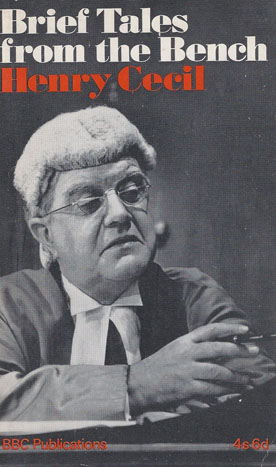
Out Of Print
Mr Blandish books in at an expensive hotel which claims in its brochures to be 'equivalent to an A.A. five star- hotel in service, comfort and food'. The food is awful and the service worse. Blandish sues the proprietors for damages and breach of contract. How can such claims be ascertained?
What sort of justice can be brought to bear? Mr Smith is delivering coal. He has parked his lorry in the path of a judge's car and, without the slightest provocation, insults the judge before giving him room to pass.
Is Smith guilty of contempt of court? Two motorists, Morris and Riley, nearly have a collision. The fault was Morris's, and Riley, furious, hits him. Morris sues for assault and the value of a new gold wrist watch. Riley denies that Morris was wearing that particular watch at the time of the assault. Is this a case of perjury?
These are just three of the eight 'tales' which Henry Cecil tells in this book. Four are based on actual cases tried by him in his eighteen years as a judge. Four are imaginary, yet founded on the law he knows so well. With quite a collection of unusual and eccentric witnesses, and even one by no means typical solicitor, Henry Cecil recreates in lively fashion typical trials in a County Court.
He shows the humour and tolerance that a judge needs, and reveals, too, the kind of difficulties he must cope with when listening to the contradictory stories of two witnesses who both seem to be telling the truth.
First broadcast as a series of half-hour plays in which Andrew Cruickshank played the lead, Brief Tales from the Bench is a notable addition to the works of Henry Cecil, which include the novels Brothers in Law, Settled out of Court, Alibi for a Judge and According to the Evidenceall of which were made into plays.
The cover photograph shows Andrew Cruickshank as Mr Justice Carstairs in Alibi for a Judge which ran in the West End for nearly two years.